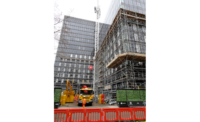Transit
UK High-speed Rail Pullback Limits Route's Capacity, Report Says

Because the high-speed trains will be smaller than existing rolling stock, the line’s capacity will fall.
Rendering courtesy HS2 Ltd.
In its current configuration, the U.K.'s new multibillion-dollar high-speed railroad, HS2, will reduce the system's capacity along the route by nearly a fifth, according to a new assessment by the official National Audit Office. The impairment follows last year’s cancellation by the former Conservative government of the line's roughly 150-km Birmingham-Manchester section.
Last September, former prime minister Rishi Sunak dramatically canceled all preparations on the northern leg of HS2 and paused work at the London terminal at Euston and the tunnels leading into it. By then, the line's developer HS2 Ltd. (HS2L) had invested around $2.2 billion on the canceled sections, including costs for drilling more than 1,000 investigation boreholes.
The plan now is for the high-speed trains on the new London-Birmingham section to move onto existing tracks to Manchester. But because the 225-km-per-hour trains being built by the Hitachi-Alstom joint venture are smaller than current rolling stock, the capacity will be 17% less, say the auditors. Capacity could be raised by investing more on longer trains and station platforms, adds NAO.
One reason cited for the program’s curtailment was cost escalation. By then, HS2L had forecast the cost at up to $74 billion, at 2019 prices, which was $4 billion more than government projections. Civil construction costs had bloated by $7.8 billion.
HS2L has spent $36 billion on the continuing London-Birmingham phase and $2.2 billion on the canceled phases 2a and 2b. Closing down the canceled work will add another $130 million.
NAO has identified several causes of cost hikes in the civil work, including a contractual overemphasis on meeting schedule targets rather than managing spending. Investing in efforts to meet overambitious milestones "drove inefficiencies in the design process."
Budgets had been set on "immature designs and data," while HS2L "had limited cost information from the supply chain." Additionally, the contractors lacked the capacity and skills to "manage such a large program of design, delivery and assurance."
While construction remains on schedule, HS2L's efforts to control costs by contract modifications "have not worked as intended," notes the auditor. The owner now plans further negotiated attempts to manage costs. But it has told the NAO that "successfully renegotiating major contracts that are already in progress will not be straightforward."
 Only the London-Birmingham section (blue line) remains from the originally planned system. Map courtesy HS2 Ltd.
Only the London-Birmingham section (blue line) remains from the originally planned system. Map courtesy HS2 Ltd.Meanwhile, as the program moves from civil construction to systems installation, HS2L hopes to learn some hard lessons from the London Crossrail project. Now named the Elizabeth Line, the capital's new east-west railroad has become an operational success, but only after costly delays in commissioning. The engineer who led that final phase was Mark Wild, who was recently appointed HS2L's new CEO.




